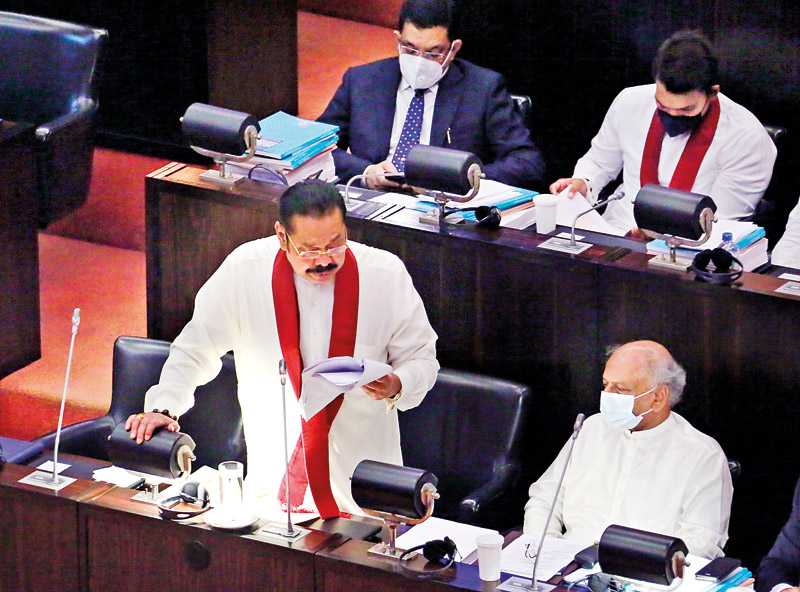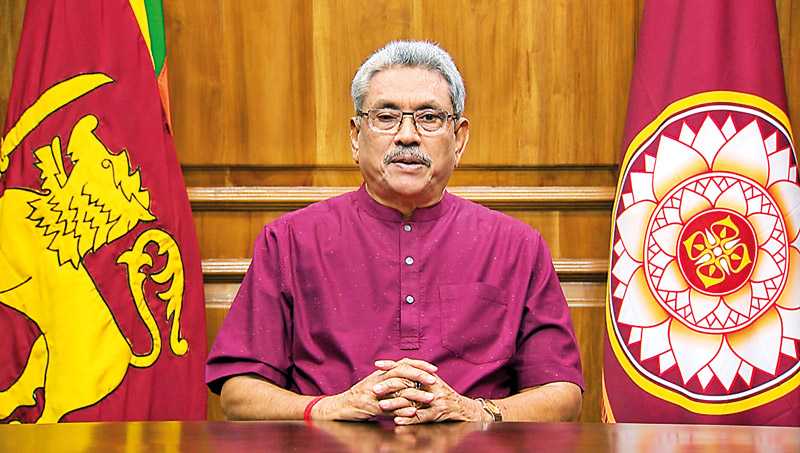Saturday Feb 21, 2026
Saturday Feb 21, 2026
Monday, 23 November 2020 01:00 - - {{hitsCtrl.values.hits}}


“Guts lead to glory,” GR said, and the Budget needs a lot of that to achieve its targets
 The maiden Budget of the new regime, as a demonstration of President GR’s ‘Vistas of Prosperity and Splendour,’ was read out by the two-in-one Prime Minister cum Minister of Finance (PM-MoF) without much fanfare.
The maiden Budget of the new regime, as a demonstration of President GR’s ‘Vistas of Prosperity and Splendour,’ was read out by the two-in-one Prime Minister cum Minister of Finance (PM-MoF) without much fanfare.
No doubt, it was a Budget presented at a very challenging time, and, in tune with the Government’s populist mindset, it promised many things to many people in the name of development. As expected, it is a deficit Budget and that deficit would have been higher had the establishment been honest with statistics and accounting.
The Opposition highlighted the misplacement of Rs. 700 billion worth of this year’s expenditure into the already audited accounts of 2019. Had that amount been accounted honestly the magnitude of the current budget deficit would have been larger.
However, with an expected revenue of Rs. 1.9 trillion and an expenditure commitment of Rs. 3.5 trillion there is a deficit of Rs. 1.6 trillion or 9% of GDP, of which almost two-fifth is expected to be funded from foreign sources. The specifics about those sources were not spelt out. There is also a promise of reducing the level of that deficit to 4% by 2025.
While one newspaper quite justifiably described the Budget as “oozing with over-optimism,” the National Chamber of Commerce, the corporate club of Sri Lanka, provided guarded support after pointing out that the “Budget proposals of 2021 hinges on achieving the revenue targets”. In short, the Budget is less a “bedrock of a new growth wave,” as State Minister Cabraal boasted, but more a budget drafted with populist exuberance to deepen the country’s debt burden.
Disturbing aspects
A few disturbing aspects of the budget need highlighting. In a mood of sheer desperation and to seek and increase private direct investment the Budget reiterated an earlier announcement by the Central Bank to adopt a policy of no questions asked if illicitly accumulated funds would be brought from abroad and invested in local projects.
Isn’t this an open invitation for money laundering? Does the President, his PM and cabinet of ministers think of the adverse reaction from international institutions if SL becomes a haven for this illegal financial ablution?
Even with all lucrative incentives offered for such investments there is no way the Government could avoid more borrowing to finance the deficit. But that will become extremely costly if money laundering is encouraged. Ultimately, the onus of financing the deficit will fall on the Central Bank, whose printing machine will have to work overtime. This will inevitably enhance inflationary pressures.
Without taxing the wealthy and big corporations the Budget continues to depend for its revenue on indirect taxes and it is proposing a simplified Goods and Services Tax (GST) on alcohol, cigarettes, betting, gaming, telecommunication and vehicles. Tax on these items account for about 50% of total tax revenue. Given the extent of corruption in the country, whether the proposed GST, even if mechanically operated, would create a flourishing grey economy, only time would tell.
In the meantime, continuing import restrictions on consumer essentials in the name of advancing domestic production, though makes economic sense, yet it needs supportive measures to make the policy successful. On the other hand, import restrictions have already raised the ire of the European Union, which is the second largest export market for Sri Lanka. Restriction on imports cannot avoid negative impact on exports also.
The Budget’s hastiness in expanding university education is also a populist measure rather than one based on a studied understanding of the real issues in university education. The need of the day is to improve the standard of education in the existing universities, which are already too many, rather than adding to their number.
There is an acute deficiency of qualified teachers in the universities, and majority of graduates passing out of these institutions are unemployable in the market. This explains why the public sector is carrying an excess burden of arts and science graduates. Churning out graduates without a need for them is a colossal waste of scarce resources.
Worrying phenomenon
Another worrying phenomenon is the Budget allocation for security. As one Tamil Member in the Parliament pointed out, expenditure on the military has been increasing even though the war has ended. Accordingly, Budget allocation for security has increased from Rs. 312 billion in 2020 to Rs. 355 billion in 2021. The military has now become another white elephant.
If extremism and the underworld have been wiped out as the President claims, then what is the rationale for sustaining a huge military? It is the fear deliberately created by a supremacist-autocracy that another war is imminent, which prevents demobilisation of the Army. The military is not only a drain on the country’s finance but is also making economic revival and development more difficult.
It should be understood that the sources of economic growth in Sri Lanka go beyond pure economics. Without building the foundation for a united society with its ethnic and cultural diversity economic development of the country will always be suboptimal. COVID-19 has made it worse. Perhaps, the rulers want the disunity to prevail to remain in power.
In a sense, analysing this will take us nowhere, because as mentioned in a peace published earlier in this journal the superman at the top can always change Budget allocations willy-nilly as long as there is a Parliament prepared to rubberstamp his decisions. “Guts lead to glory,” GR said, and the Budget needs a lot of that to achieve its targets.
(The writer is attached to the School of Business & Governance, Murdoch University, Western Australia.)